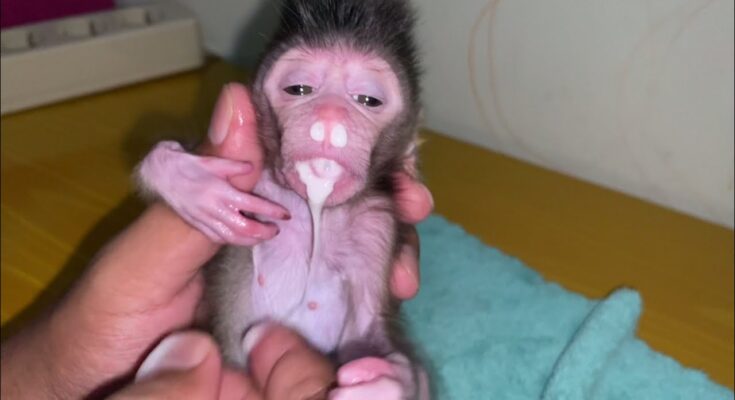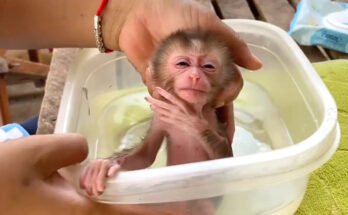The early days of a newborn monkey’s life are supposed to be filled with warmth, nourishment, and the gentle embrace of its mother. However, a heartbreaking scene unfolded when a fragile baby monkey struggled to drink milk, only for it to overflow from its tiny nose and mouth, leaving it gasping for breath.
Helpless Baby Monkey Sleeps Peacefully, Clutching a Hand for Comfort
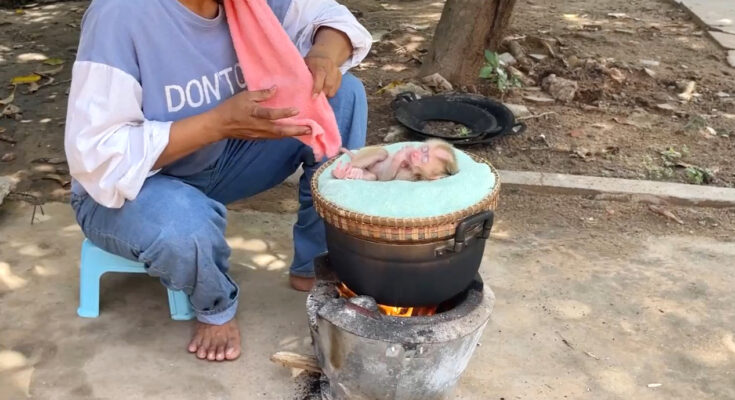
Raising a baby monkey is a big responsibility that requires deep understanding, patience, and care. These intelligent and emotional creatures need proper nutrition, warmth, and social bonding to thrive.
Can You Feed a Baby Monkey?
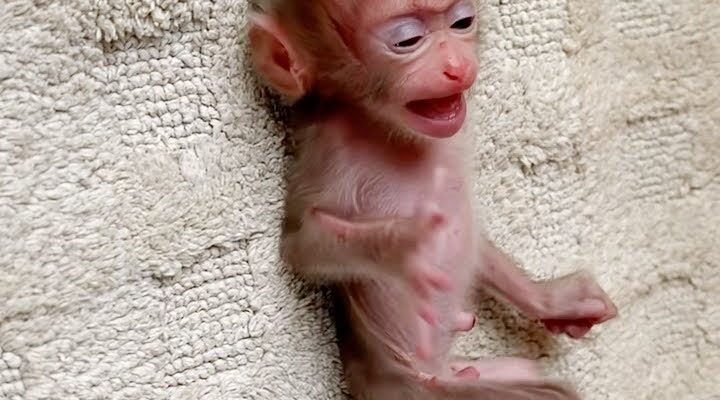
Caring for Your Newborn Baby Monkey Made Easy! 🐒✨ Discover vital care tips that cover everything from feeding to playtime. Equip yourself with knowledge for a successful start in your monkey’s life. Click now to learn how to create a nurturing home!
Baby monkeys are adorable and often attract a lot of attention. If you ever come across one, you may wonder whether you can feed it. While feeding a baby monkey might seem like a kind gesture, it is essential to understand their dietary needs and the potential risks involved.
Understanding a Baby Monkey’s Diet
In the wild, baby monkeys rely on their mother’s milk for nutrition. As they grow, they gradually transition to solid foods, including fruits, leaves, and insects. The diet of a baby monkey depends on its species, age, and environment.
Can You Feed a Baby Monkey Formula or Milk?
If a baby monkey has been separated from its mother, it may require special formula designed for primates. Cow’s milk and other dairy products can be harmful because they do not provide the right nutrients and may cause digestive issues. Specialized primate formulas, often used in zoos and rescue centers, are the best option.
What Solid Foods Can a Baby Monkey Eat?
Once a baby monkey begins to wean, it can start eating soft fruits like bananas, mangoes, and papayas. Other recommended foods include:
- Boiled sweet potatoes
- Soft vegetables like carrots and cucumbers
- Small amounts of cooked rice or oats
It is crucial to avoid processed or sugary foods, as they can harm a baby monkey’s health.
Risks of Feeding a Baby Monkey
While feeding a baby monkey might seem harmless, there are several risks to consider:
1. Dependency on Humans
Feeding wild or rescued monkeys can lead to dependency, making it difficult for them to survive on their own.
2. Nutritional Imbalances
Improper feeding can lead to malnutrition or digestive issues, especially if the monkey receives an unbalanced diet.
3. Legal and Ethical Concerns
In many countries, keeping or feeding wild monkeys without proper permits is illegal. It is always best to consult wildlife experts or rehabilitation centers before attempting to feed a baby monkey.
What to Do If You Find an Orphaned Baby Monkey
If you encounter an abandoned or injured baby monkey, the best course of action is to contact a local wildlife rescue center. Trained professionals know how to care for young monkeys properly and will ensure they receive the necessary care.
Conclusion
While it might be tempting to feed a baby monkey, it is not always the best decision. Monkeys have specific dietary needs, and improper feeding can do more harm than good. If you ever come across a baby monkey in need, the best approach is to seek help from wildlife professionals.
Newborn Baby Monkey’s First Bath – Adorable Reaction to Water!
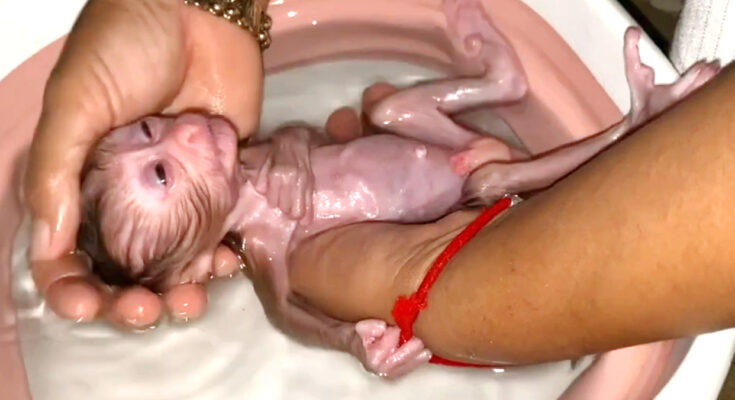
Discover Essential Tips for Raising a Newborn Baby Monkey! 🐒✨ From bonding basics to health care, learn how to give your baby monkey the best start. Dive into the world of primate parenting and uncover expert advice on nutrition, safe handling, and creating a nurturing environment. Whether you’re a first-time caregiver or an animal enthusiast, these tips will help ensure your little one’s growth and happiness. Start your journey with confidence!
Step-by-Step Guide to Feeding a Baby Monkey 🍼🐒
- Understand Their Diet
Baby monkeys require a diet similar to what they’d consume in the wild. Start with specialized milk formulas for primates or fruits like bananas and papayas. - Sanitize Feeding Tools
Always use clean bottles, syringes, or bowls to prevent infections. Hygiene is crucial for their health. - Feed Small Portions
Begin with small amounts to avoid overfeeding. Monitor how much they eat to adjust as they grow. - Maintain a Feeding Schedule
Feed baby monkeys every 2–3 hours for newborns, gradually spacing it out as they age. - Observe Behavior
Watch for signs of hunger or discomfort. If they seem distressed, consult a vet experienced with exotic animals. - Provide Fresh Water
Ensure they have access to clean water at all times for hydration. - Introduce Solid Foods Gradually
Around 6–8 weeks, begin introducing soft fruits and vegetables alongside milk. - Create a Bond While Feeding
Feeding time is a great opportunity to build trust. Be gentle and patient. - Consult a Vet Regularly
Regular health checks ensure the baby monkey is growing strong and healthy.
Baby monkeys are incredibly fascinating creatures with a mix of intelligence, curiosity, and playfulness that captures the hearts of many. Here are some interesting facts about baby monkeys:
Bringing a baby monkey into your family might seem like a cute and exciting idea, but before you consider feeding and caring for one, it’s important to understand the challenges and ethical concerns involved.
Caring for Your Newborn Baby Monkey Made Easy! 🐒✨ Discover vital care tips that cover everything from feeding to playtime. Equip yourself with knowledge for a successful start in your monkey’s life. Click now to learn how to create a nurturing home!
Why Feeding a Baby Monkey Can Be Problematic
1️⃣ Dietary Needs Are Complex – Baby monkeys require a highly specialized diet to grow strong and healthy. They need a mix of fruits, vegetables, proteins, and essential nutrients that are difficult to replicate in a human home. Feeding them the wrong foods can lead to severe health issues, including malnutrition and digestive problems.
2️⃣ Dependency and Behavioral Issues – Feeding a baby monkey in a home environment can cause it to become overly dependent on humans. As they grow, monkeys can become aggressive, territorial, and unpredictable, making them difficult to manage.
3️⃣ Health Risks for Both the Monkey and Humans – Monkeys can carry diseases that are dangerous to humans, and vice versa. Close contact, including feeding, increases the risk of disease transmission.
4️⃣ Legal and Ethical Considerations – In many places, owning or feeding a monkey is illegal without proper permits. Baby monkeys belong in the wild or specialized sanctuaries where they can thrive naturally.
What’s the Best Alternative?
If you love baby monkeys, the best way to support them is by learning about their natural habitat, supporting conservation efforts, and visiting ethical sanctuaries. Instead of trying to feed one at home, consider donating to organizations that help rehabilitate and protect these intelligent creatures.
Final Thought
While feeding a baby monkey might seem like a caring gesture, it often does more harm than good. These wild animals deserve to live in their natural environment, surrounded by their own kind, where they can grow and thrive as nature intended.
What are your thoughts on keeping baby monkeys as pets? Let’s discuss in the comments! 🐒💬
